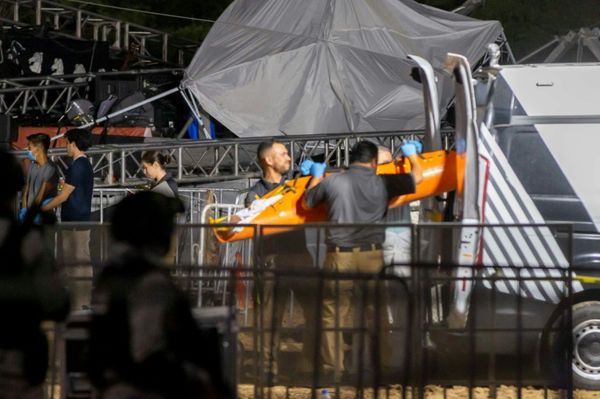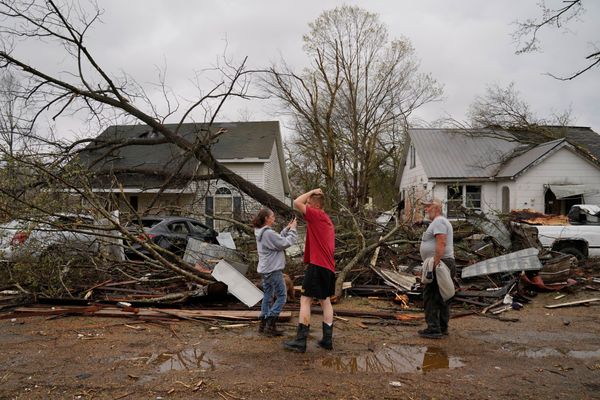Rapid evolution is stripping threatened native marsupials of the key survival skills they need to exist in the wild, new research has found.
Woylies are a nocturnal mammal the size of a rabbit, also known as a brush-tailed bettong.
They once ranged in their millions across southern and central Australia, but were almost wiped out by feral cats and foxes.
Critically endangered, they survive mainly in predator-free havens, part of a vital conservation strategy designed to protect the species from predators and allow them to thrive.
But that appears to be having unintended consequences which may endanger their long-term survival.
A study into the behaviour of woylies living in a fenced-off sanctuary in Western Australia, published in the Biological Conservation journal, found they lost essential traits needed to escape predators.
It has implications for other threatened animals whose populations are recovering in havens, and also for long-term plans to eventually reintroduce threatened species back into the wild.
Woylies evolving in predator-free environments
Tash Harrison, lead author and PhD candidate at the University of Western Australia's School of Biological Sciences, said there needed to be a rethink of conservation strategies.
"If they're not able to respond appropriately to predators, and we can't put them back in the wild, it just means that our conservation measures might not be as effective as we hoped," she said.
The collaboration between UWA and WA's Department of Biodiversity, Conservation and Attractions pointed to a rapid evolution where the natural selection occurring inside the artificial predator-free environments offloaded traits needed to survive attack by feral cats, foxes or native predators on the outside.
The research team examined 10 years of data collected by the department to compare woylies in the Perup sanctuary, a protected haven near the town of Manjimup in WA's south-west, with the marsupials ranging free in the wild on the other side of the fence.
That is one of only two locations in Australia where woylies still roam free, the other being Dryandra, near the town of Narrogin in WA's Wheatbelt region.
Ms Harrison said they looked at six anti-predator traits, and the results were stark.
"We found that after 10 years inside the haven, our population of woylies have weakened anti-predator responses," she said.
"So they've become less reactive, less likely to run away from predators.
"They've become smaller, their feet have become shorter because without foxes and cats to run away from, it's less benefit to being big and they've also lost some of their natural anti-predator responses like ejecting the young as an escape distraction."
That's when woylies are under attack and remove their joey from their pouch to sacrifice them and make their escape.
'A colossal challenge'
Dr Adrian Wayne, a senior research scientist with the Department of Biodiversity, Conservation and Attractions, said the study demonstrated how woylies in havens had lost their street smarts.
"All of this evidence lined up together provided the scientific evidence that what we're seeing is woylies in havens are changing, and are losing their defences that helped them in case they encounter a predator," he said.
With feral cats and foxes still widespread and already causing 28 species of mammals in Australia to become extinct, the findings are not only worrying for woylies.
There are also concerns for other havened animals and any long-term plans to release them back into the wild.
"If, like woylies, other species in the havens are losing their street smarts for life in the presence of foxes and cats, it means that we are essentially making them dependent on living life in havens, and potentially limiting our ability to recover the species across their former ranges in the wild, without complete removal of foxes and cats," Dr Wayne said.
"And that's a colossal challenge at the moment."
Anti-predator smarts the key
UWA Professor Nicki Mitchell, a member of the Biodiversity Council and co-author of the study, said it presented a new challenge for conservation.
"In many ways, havens have been a huge success; free from predation by cats and foxes, populations of many mammals like the woylie have greatly increased inside havens and at least 13 extinctions have been avoided," Professor Mitchell said.
"However, havens cover only around 0.1 per cent of the country, and represent only a tiny fraction of the former areas of the species they contain.
"For genuine conservation we also need to restore animals back to former areas, where these animals played important roles in nature."
How to do that in a way which allows them to retain those essential survival traits, their anti-predator smarts, is now the challenge confronting researchers and conservationists.
Ms Harrison and Dr Wayne suggested exploring ways to expose them to a manageable or low level of predators within the havens, such as one fox or one cat.
"Which means that not only do they flourish, but they also keep their smarts that are necessary for their long term conservation and recovery in the wild," Dr Wayne said.
It could involve native predators, such as the chuditch or western quolls, which are not as deadly as feral cats or foxes.
"That might help to maintain some broad anti-predator responses that would allow them to respond appropriately to foxes and cats in the future," Ms Harrison said.
The key is finding the natural selection needed for long-term conservation.







